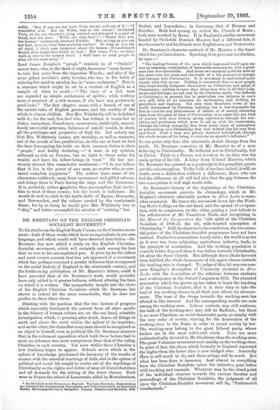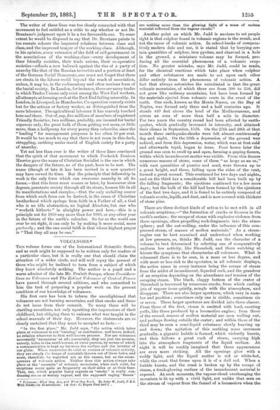DR. BRENTANO ON THE ENGLISH CHRISTIAN- SOCIALIST MOVEMENT.* To his
studies on the English Trade Unions, on the Chartist move- ment—both of them works which have no equivalents in our own language, and which would well have deserved translation—Dr. Brentano has now added a study on the English Christian- Socialist movement, which will certainly rank among the best that we owe to his accomplished pen. It gives by far the fullest and most correct account that has yet appeared of a movement Which has perhaps exercised a greater influence than is supposed on the social history of England in the nineteenth century, and the forthcoming publication of Mr. Maurice's letters, could it have preceded that of Dr. Brentano's work, would probably have only added to it greater fullness, without altering the lines on which it is written. The sympathetic insight into the views of the English Christian Socialists which Dr. Brentano has shown is indeed all the more remarkable, that he does not profess to share these views.
Starting with the position that the two factors of progress which especially distinguish the present from all other epochs in the history of human culture are, on the one hand, scientific investigation, which, in pressing after truth, draws all things in earth and above the earth within the sphere of its inquiries ; and on the other, the claim that every man should be recognised as an object to himself, even in political life, Dr. Brentano observes that in the vehement opposition which both these factors had to meet, no influence was more conspicuous than that of the ruling Churches in each country. Yet soon within those Churches a new tendency began to appear. Schools arose which in the sphere of knowledge proclaimed the harmony of the results of science with the essential teachings of faith, and in the sphere of political and social life sought to evolve out of the teachings of Christianity on the rights and duties of man all liberal doctrines and all demands for the raising of the lower classes. Such were in France the school of Lamennais, aided by Montalembert,
• Dis Catania-sprints Bearegun9 in England. Von Lujo Brentano. Bepnrstabzug ens Jahrbnch tor Gesetzgehnne, Verwaltung. and Volkswirthschatt lin Deutseben Rekthe. Herausgegeben eon G, dohmoller. Leipzig: D,mkler and Hambiot. 1883.
Gerbet, and • Lacordaire ; in Germany, that of Hermes and Gunther. Both had sprung up within the Church of Rome ; both were crushed by Rome. If in England a similar movement headed by Frederick Denison Maurice had a different fate, it was because he and his friends were Englishmen and Protestants.
Dr. Brentano's character-portrait of Mr. Maurice is the finest which has yet been drawn. Speaking from personal recollection, he says :—
" The leading feature of the man which impressed itself upon me was an imposing combination of inexorable earnestness, with a good- ness that was irresistible. And those two essential qualities were at the same time the cause and the result of a life penetrated through and through with Christianity. It is necessary to understand quite clearly what this means. Nothing is commoner than to meet people who emphatically designate themselves as Christians, and speak of Christianity; nothing is rarer than those men who, in all their judg- ments and dealings, aro led only by the Christian spirit. One believes in Christianity in general, but in particulars one believes in one's own self, with all its interests. its inclinations, and dislikes, its prejudices and caprices. Not only were Maurice's views of the world determined by Christian teaching, but it was impossible for him to consider any phenomenon of nature or of society otherwise than from the point of view of Christianity, or to enter into any kind of contact with men without giving expression, through the sim- plicity and gentleness which were bored up with his earnestness, through his loving sympathy, free from every trace of assumption or self-seeking, to a Christianity that had worked into his very flesh and blood. Such a man was plainly destined beforehand, through the whole nature of his being, to exercise an apostle's influence."
In one point only does this admirable sketch diverge from the truth. Dr. Brentano conceives of Mr. Maurice as of a man believing in Christianity. He believed not in Christianity, but in Christ. Faith in a Person, not devotion to an idea, was the main-spring of his life. A letter from Colonel Maurice, which Dr. Brentano has printed as a postscript to his pamphlet, points out this misconception. To the bulk of readers, indeed, it will, no doubt, seem a distinction without a difference; those who can feel the difference at all will feel also that the gap between the two conceptions is well nigh world-wide.
Dr. Brentano's history of the beginnings of the Christian- Socialist movement corrects its chronology, which in Mr. Hughes's otherwise admirable preface to Alton Locke is some- what misstated. He traces the movement down into the Work- ing-Men's College on the one hand, and the spread of coopera- tion, with its congresses, on the other, paying a jest tribute to the self-devotion of Mr. Vansittart Neale, and recognising in his Manual for Co-operators the "old spirit of the Christian Socialists of 1818-54, the old, wide-hearted conception of Christianity." Still, he observes in his conclusion, the two essen- tial points of the Christian-Socialist programme have not been realised. Productive associations barely exist ; the world is as far as it ever was from subjecting agriculture, industry, trade, to the principle of association. And the working population is scarcely better disposed than it was before towards Christianity, let alone the State Church. But although these ideals have not been fulfilled, the whole demeanour of the upper classes towards the working-men is changed. To judge of this, let any one com- pare Kingsley's description of University students in Alton Locke with the description of the relations between students and working-men at the Oxford Congress in 1882. The educated generation which has grown up has taken to heart the teaching of the Christian Socialists, that it is their duty to take the lead of the working-classes in all their just efforts for advance- ment. The tone of the clergy towards the working-men has altered in like manner. And the corresponding results are seen among the working-men. Labour contests may still continue, the bulk of the working-men may still be Radicals ; but there is no more Chartism, no social-democratic party, at enmity with the very order of society, striving for the domination of the working-class in the State, in order to recast society by law. The working-men belong to the great Liberal party, whose leaders are in the most cultivated circle. None are more enthusiastically devoted to Mr. Gladstone than the working-men. The great Volunteer movement rests mainly on the working-class. In point of fact, the abyss which formerly in England separated the higher from the lower class is now bridged over. Assuredly dere is still much to do, and there always will be much. But what has been done is immense. And almost in everything have the Christian Socialists taken the initiative, gone before with teaching and example. Whatever may be the stand-point of the individual observer towards the various theories and proceedings of the Christian Socialists, the judgment of all upon the Christian-Socialist movement will be, "Pertransivit benefaciendo." The writer of these lines was too closely connected with that movement to feel entitled as a critic to say whether or not Dr. Brentano's judgment upon it be a too favourable one. To some extent he would be disposed to say that Dr. Brentano paints in too roseate colours the improved relations between class and class, and the improved temper of the working-class. Although, in his opinion, every extension of the field of self-government in the associations of the working-class—every development of their friendly societies, their trade unions, their co-operative societies—affords a new bulwark against the rise of a party of anarchy like that of the Russian terrorists and a portion at least of the German Social Democrats, one must not forget that there are strata in the labour-world beyond the reach of association, unless, it may be, in the rudimentary and often noxious form of the burial society. In London, for instance, there are many trades in which Trades Unions only exist among the West End workers, all attempts at forming such at the East End failing miserably. In London, in Liverpool, in Manchester, Co-operation scarcely exists but for the artisan or factory worker, as distinguished from the mere labourer. The agricultural labourer it has scarcely touched here and there. Out of, say, five millions of members of registered Friendly Societies, two millions, probably, are insured for burial expenses only, the great hulk of them getting not more, or little more, than a halfpenny for every penny they subscribe, since the " loading " for mauagement purposes is too often 50 per cent. It would be too much to say that there is not room in this dark, struggling, seething under-world of English society for a party of anarchy.
Yet not less than ever is the writer of these lines convinced that the spirit of that movement to which Frederick Denison Maurice gave the name of Christian Socialist is the one in which the dangers of the future, as of the past, have to be met. The name (though of late it has been revived in a new quarter) may have served its time. But the principle that fellowship in work is the only force which can overcome anarchy in all its forms,—that this force must sooner or later, by howsoever slow degrees, penetrate society through all its strata, human life in all its manifestations and energies,—that the only unfailing source from which such force can be derived, is the sense of Christian brotherhood which springs from faith in a Father of all, a God who is no idle abstraction, no logical Absolute, but one who " worketh hitherto" in almighty power and love,—this is a principle not for 1850 any more than for 1883, or any other year in the future of the earth's calendar. So far as the world can ever be set right, it can only be by making it more social, more partnerly ; and the one social faith is that whose highest prayer is "That they all may be one."



































 Previous page
Previous page